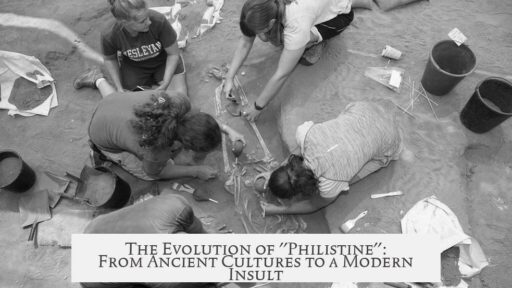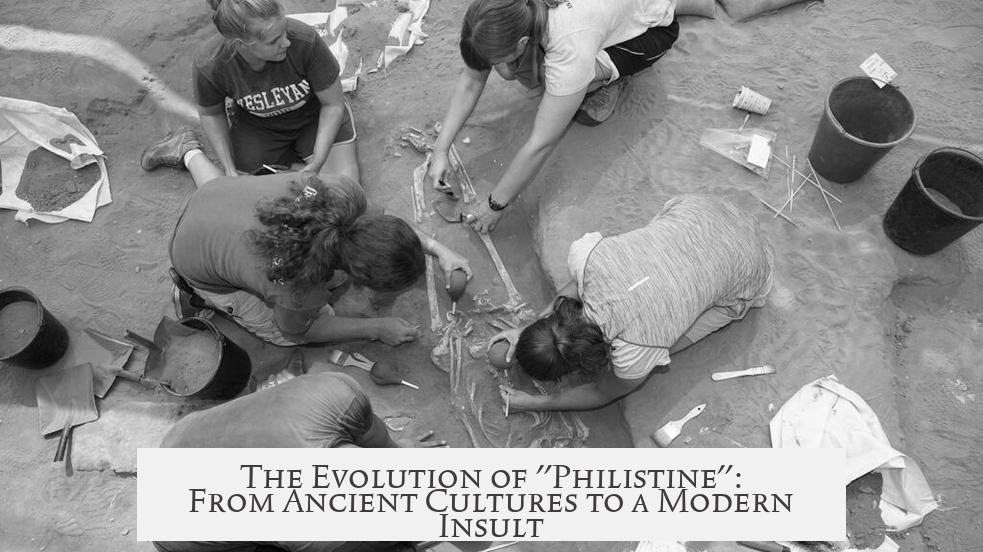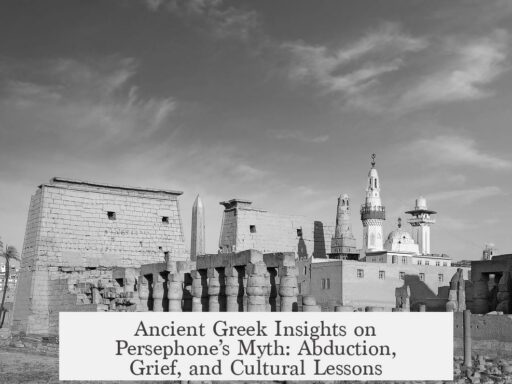“Philistine” becomes an insult starting in the 17th century. Its use shifts from a Biblical enemy to a cultural label for those seen as uncultured or hostile to intellectual and artistic values.
The word’s origin is the ancient Philistines, an ethnic group mentioned in the Old Testament. The Philistines fought against the Israelites, as seen in the famous story of David and Goliath. This provided early metaphorical meaning: an enemy or adversary.
From around the 1600s, Protestantism spread Biblical knowledge widely in Europe. This allowed “Philistine” to take on a figurative meaning in English. It described a foe or persecutor, or even a debauched person in obsolete usage. The Oxford English Dictionary records this figurative use beginning in the 17th century.
Simultaneously, a distinct cultural usage arose in Germany. Starting in the late 17th century, university students used the term Philister as a derogatory label for townspeople or non-students. This group was viewed as outsiders and enemies of academic life.
- In 1693 at Jena, a town and gown conflict led to “Philistines” being a pejorative term for these outsiders.
- Later writers such as Thomas Carlyle (1831) and Sir Arthur Helps (1859) referenced this German usage as meaning a dull or stupid person.
- An 1856 Edinburgh magazine noted that people entering government life were said to “go back to the Philisters.”
The term crossed into English academia and general use during the 18th and early 19th centuries. British figures and institutions used “Philistine” to describe common citizens or those outside academic or intellectual culture.
- Example: An 1824 British Prime Minister referred to ordinary citizens as “Philistines,” denoting them as despised by academics.
- The 1853 Yale Literature Magazine noted similar terms used for non-students such as “Snobs” or “Townies.”
Over the 19th century, the insult became firmly established. It fused the Biblical enemy sense with the German student slang meaning of uncultured non-academic. This fusion created the modern sense: “Philistine” as a person who lacks appreciation for art, culture, or intellectual life.
Examples of this meaning appear in 19th-century writings:
- An 1827 London newspaper contrasts the “obtuseness of a mere English Philistine” with German cultural values.
- A Dartmouth College address refers to a “Philistine” as an uncultured person opposing higher intellectual interests.
- Leslie Stephen in 1879 clarifies “Philistine” as someone indifferent to refined intellectual pursuits.
The insult comes from a convergence of two ideas:
- Philistines as Biblical enemies representing opposition or ignorance.
- German student slang marking outsiders or non-intellectuals as inferior.
The combined meaning labels someone uncultured, materialistic, or hostile to higher learning or art.
“Person deficient in liberal culture,” originally popularized by Thomas Carlyle and Matthew Arnold, drawn from German Philister, meaning “enemy of God’s word,” which connects back to the Biblical Philistines.
This history shows that “Philistine” became an insult roughly from the 1600s onward, gaining stronger cultural connotations in the 18th and 19th centuries. It remains in use today with the primary meaning of a person hostile or indifferent to culture and intellectualism.
- Originates from Biblical enemies of Israel, the Philistines.
- 17th-century English usage equated Philistines with foes or persecutors.
- German university students in the late 1600s used “Philister” as an insult for non-students seen as uncultured.
- The term entered English to describe uncultured or unenlightened people distinct from academic or artistic circles.
- By the 19th century, “Philistine” widely meant a person indifferent or hostile to culture and intellectual life.
When and Why Did “Philistine” Become an Insult?
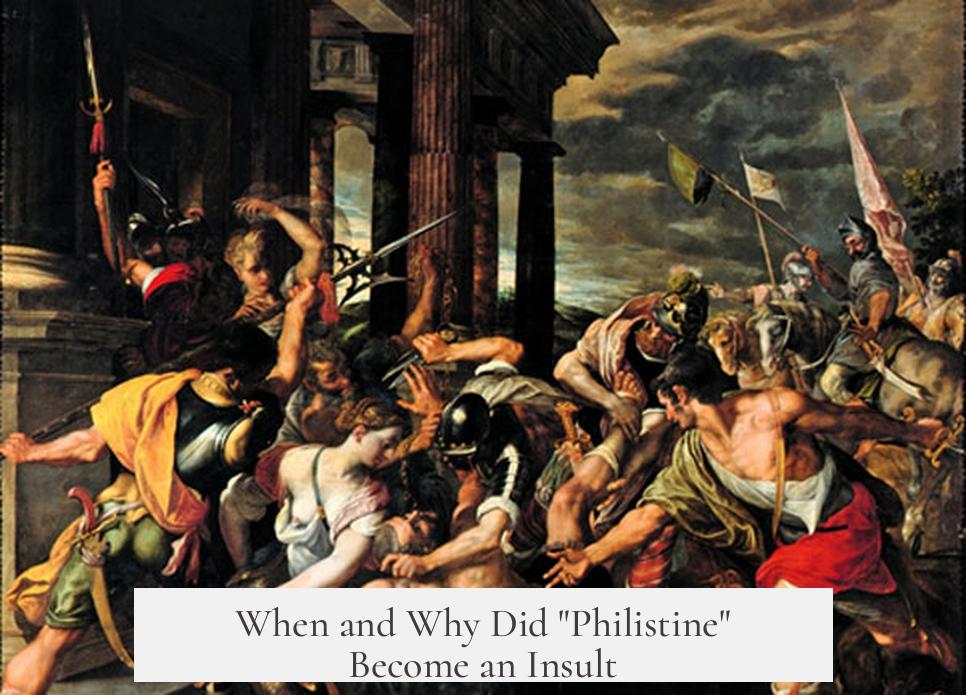
The word “Philistine” became an insult gradually, starting around the 17th century—thanks to a mix of biblical history, German student slang, and cultural clashes. It came to mean someone uncultured, materialistic, or indifferent to art and intellect. Let’s unpack this curious journey.
You might picture “Philistine” as just a dusty biblical term. But hold on! This word carries centuries of layered meanings. It all starts in the ancient world.
From Ancient Enemies to Modern Insults
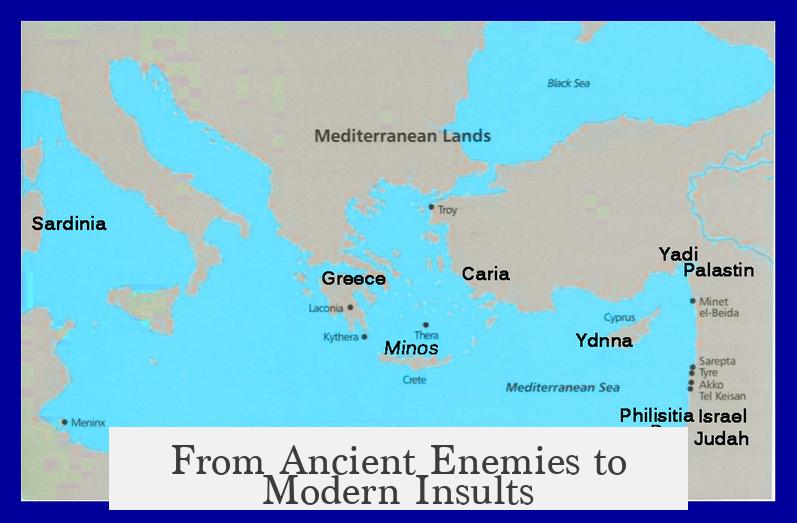
The Philistines were a real people mentioned in the Old Testament. Ever hear of David and Goliath? David was an Israelite; Goliath was a Philistine warrior. They fought bitter battles reflecting long-standing animosity.
This background planted the first seed: Philistines = enemies, opponents, or “the other,” at least from the Israelites’ viewpoint. So, centuries ago, “Philistine” meant a literal foe. Not exactly a word of endearment!
17th Century England: When Biblical Knowledge Spread
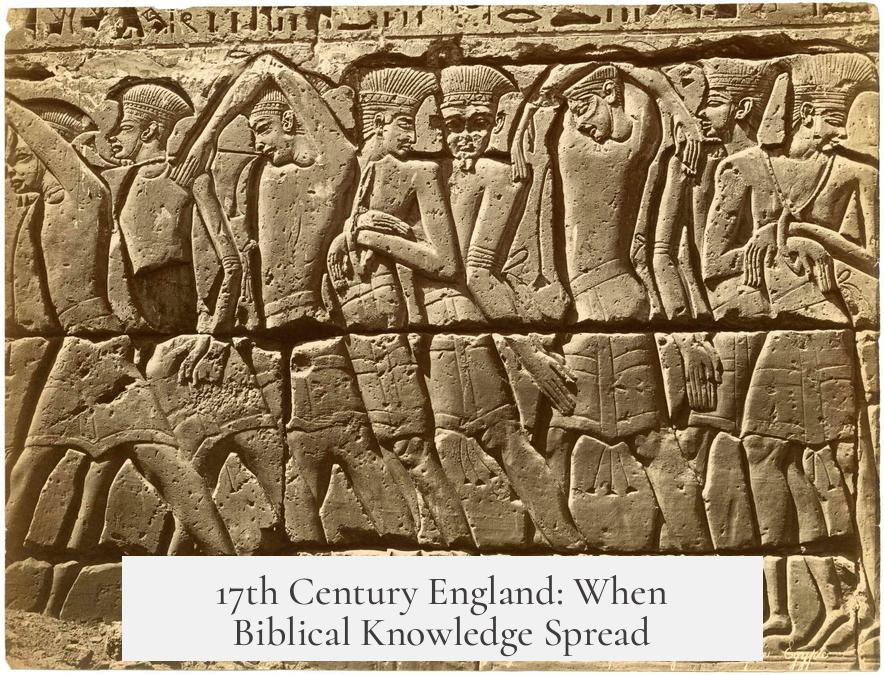
Fast forward to the 1600s in England. Protestantism’s rise made biblical literacy common. People now understood stories and enemies from the Bible better than before. Enter figurative language.
Here, “Philistine” started to slip into English with a fresh twist. It wasn’t just about the ancient enemies anymore. It came to mean someone you didn’t want on your side, essentially a cultural or spiritual adversary.
The Oxford English Dictionary points out that during this time, “Philistine” was used figuratively to describe a persecutor or a foe. Sometimes, it even described a drunken or dissolute person. Quite a range!
The German Student Influence: Meet the “Philister”
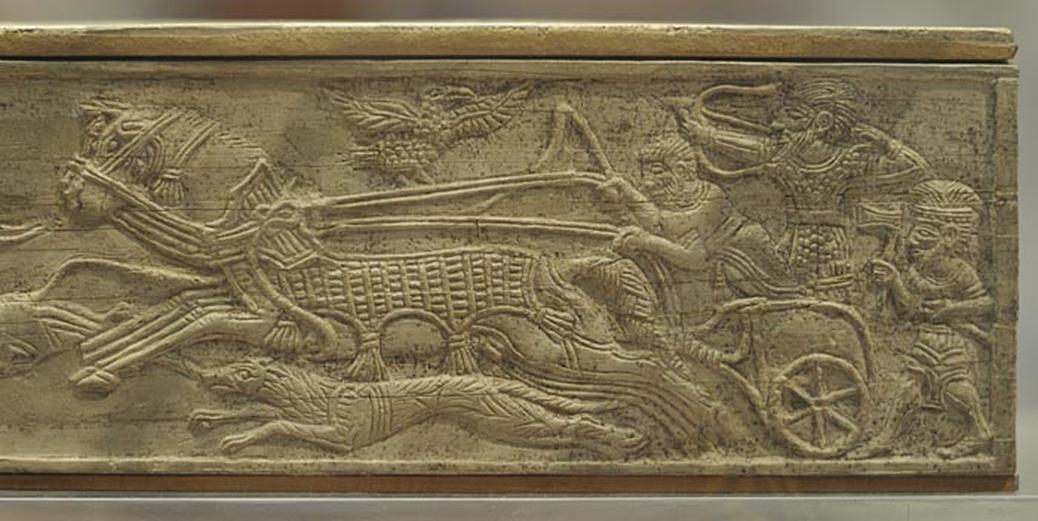
Now the plot thickens. In late 17th-century Germany, university students dealt with local townspeople, often called “Philister.” The term was a jab—it meant those outsiders who weren’t students, hence not part of academic life. These “Philisters” were seen as uncultured, ignorant, or at least “not in the club.”
This disdain came to public attention in a 1693 row at the University of Jena. Students used “Philister” to insult townsfolk who clashed with them. It was a neat label for “them”—the uncultured masses.
English thinkers later borrowed this German usage. The British Prime Minister in 1824 referred to “Philistines” in a similar way—a despised, rejected set of people outside the academic “Israel.”
Crossing the Channel: English Adoption and Evolution
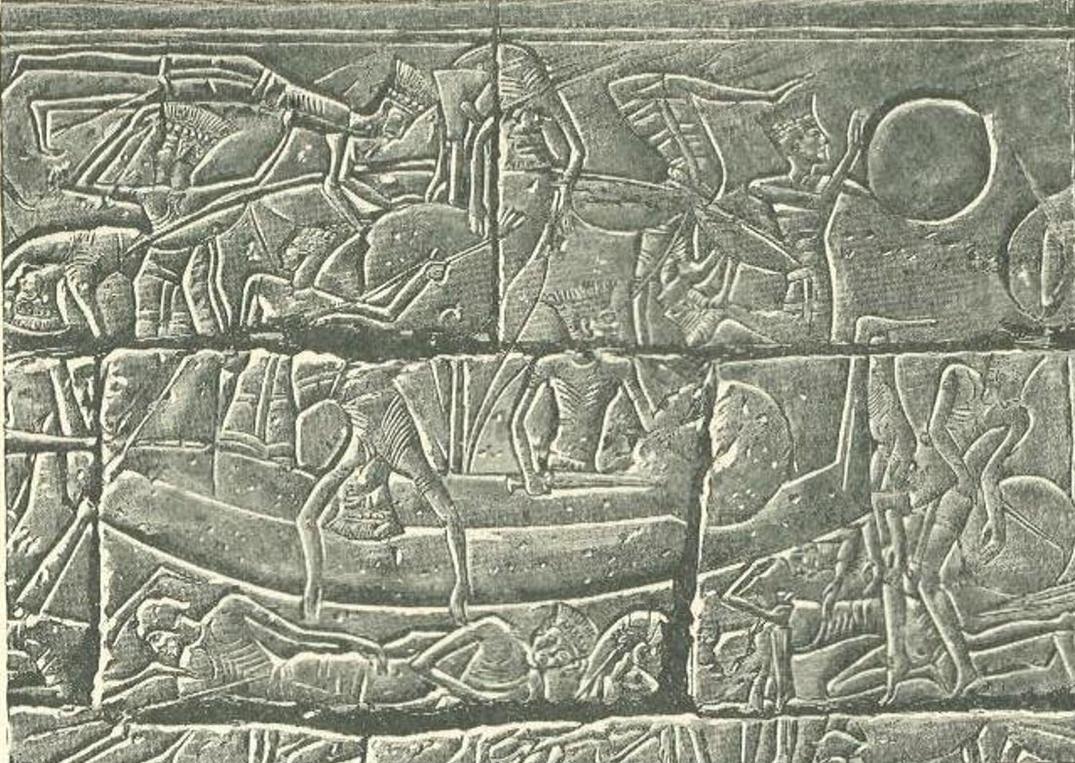
English speakers embraced the German student insult but merged it with their existing biblical understanding. This blend enriched the insult: “Philistine” no longer just meant *enemy*; it meant an uncultured person, indifferent to art and intellectual pursuits.
Examples pop up in 19th-century literature and speeches: an Edinburgh magazine in 1856 called people who retreated to government jobs “Philistines,” implying a loss of higher aspirations or culture.
Even Thomas Carlyle, a literary heavyweight, noted in 1831 that a man was sheer “Philistine,” embodying dullness and cultural blindness.
The Modern Meaning: A Clash Between Culture and Commonplace

What do we mean today when we call someone a “Philistine”? It’s not just a generic insult. It points to a specific kind of ignorance—someone who dismisses art, culture, or intellectual endeavor in favor of practical, material, or shallow interests.
Leslie Stephen, a 19th-century writer, nailed it: a “Philistine” is a person showing “indifference to the higher intellectual interests.” This insult draws on both the biblical enemy and the German academic outsider to criticize someone’s cultural sensibility.
Why Did This Pejorative Stick?
- Biblical weight: The Philistines were real foes, symbolizing opposition and bad faith.
- Academic snobbery: German students needing a label for their uncultured neighbors created “Philister.”
- English twist: Combining theology and university slang gave “Philistine” its punch as an insult for cultural indifference.
The result? “Philistine” became shorthand for a person who just doesn’t get it—whether “it” is art, music, literature, or higher learning.
What Can We Learn? A Little Perspective Goes a Long Way
So when someone calls you a “Philistine,” you can chuckle—because it’s a historical burn packed with meaning. You might be seen as a cultural enemy, a non-student outsider, or simply someone missing out on the finer things.
This term reminds us how language evolves with culture, education, and social dynamics. From ancient Near Eastern combatants to university gripes to literary critiques, “Philistine” tells a story of human division—and sometimes snobbery.
Better question: Are you a Philistine or are you ready to pick up that novel, visit a museum, or try a new form of art? Or do you revel in your “townie” ways, content outside ivory towers? The word challenges us!
Some Food for Thought
- Why do we instinctively link intellectual or artistic sensitivity with personal worth?
- How often do labels like “Philistine” shut down dialogue rather than open minds?
- Can outsiders sometimes offer fresh perspectives that insiders might miss?
These questions matter because they go beyond an insult. They push us to think about culture, identity, and tolerance.
In Conclusion
The journey of “Philistine” from biblical enemy to a cutting insult spans centuries and continents. It’s a fascinating cultural hybrid born from ancient conflict, religious influence, student rivalry, and social commentary.
Next time you hear “Philistine” thrown around, now you know why it stings. It’s not just a mean word but a history-packed label for anyone seen as standing outside the sacred halls of culture and intellect.
And hey—if you ever feel called one, it might just be time to explore a museum or crack open a poetry book. Because the best antidote to the “Philistine” charge is curiosity itself.
When did “Philistine” first become used as an insult in English?
The term began its figurative use as an insult in English in the 17th century. It originally described foes or persecutors, drawing from Biblical enemies of the Israelites, like the Philistines in the Old Testament.
Why did German students use “Philister” as a derogatory term?
From the late 1600s, German university students called non-students “Philister” to mark them as outsiders and enemies of academic culture. This usage began with conflicts like the 1693 town-gown row in Jena.
How did the German slang influence the English insult “Philistine”?
English speakers borrowed “Philistine” from the German “Philister,” linking it to uncultured town-dwellers or non-students. By the 19th century, it described people indifferent or hostile to culture or intellectual pursuits.
What meanings combined to make “Philistine” an insult?
The insult arises from mixing the idea of biblical enemies with the German student term for outsiders. It came to mean a person lacking culture, refinement, or appreciation for art and intellect.
When did “Philistine” settle into its modern usage as a cultural insult?
By the 19th century, especially through writers like Carlyle and Arnold, “Philistine” commonly referred to someone seen as ignorant or uninterested in higher intellectual and artistic values.
